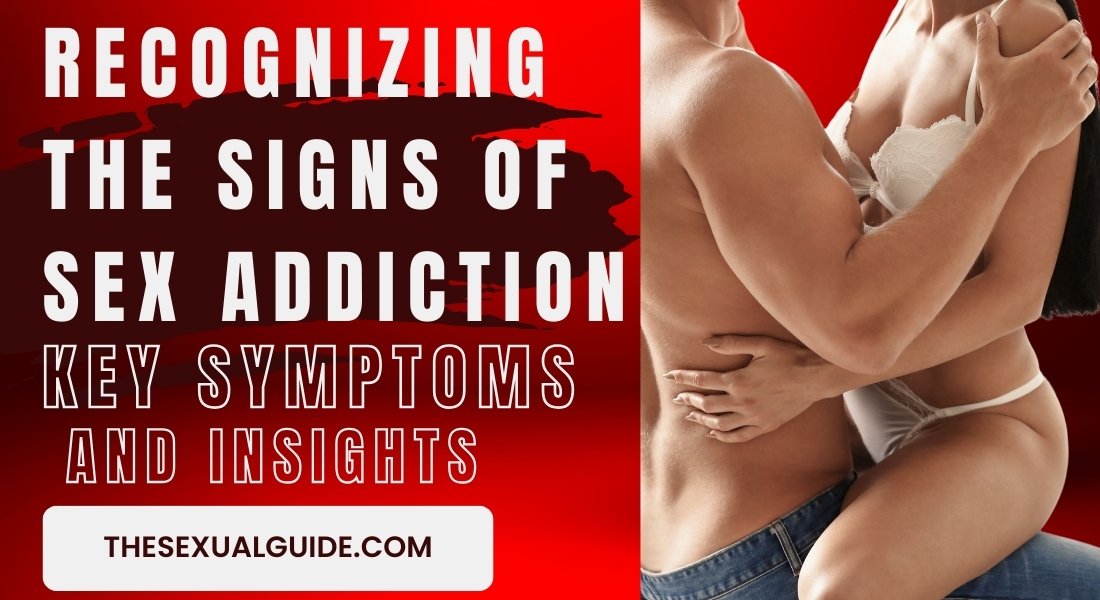Sex addiction, also known as compulsive sexual behavior disorder, is a complex condition that can significantly impact an individual’s life and relationships.
Recognizing the signs of sex addiction is the first step toward understanding and addressing the issue.
This article will guide you through the key symptoms, potential causes, and treatment options for sex addiction, providing valuable insights to help you or someone you care about.
What Is Sex Addiction?
Sex addiction involves a persistent pattern of compulsive sexual thoughts and behaviors that interfere with daily life.
Individuals with sex addiction often feel unable to control their sexual urges, despite negative consequences.
This condition can lead to emotional distress, relationship problems, and even legal issues.
Key Characteristics of Sex Addiction
- Loss of Control: Difficulty managing sexual urges and behaviors.
- Preoccupation: Spending excessive time thinking about or engaging in sexual activities.
- Negative Consequences: Continuing sexual behaviors despite harmful effects on relationships, work, or health.
Common Signs of Sex Addiction
Recognizing the signs of sex addiction can be challenging, as they often overlap with other issues. However, certain behaviors and patterns may indicate a problem.
Behavioral Signs
- Frequent Engagement in Sexual Activities: Engaging in sexual activities more often than intended, sometimes with multiple partners.
- Risky Sexual Behaviors: Participating in unsafe sexual practices, such as unprotected sex or sex with strangers.
- Obsessive Use of Pornography: Spending excessive amounts of time viewing pornography, often at the expense of other responsibilities.
Emotional Signs
- Guilt and Shame: Feeling intense guilt or shame after engaging in sexual activities.
- Anxiety and Depression: Experiencing anxiety or depression related to sexual behaviors.
- Emotional Numbness: Using sex as a way to escape from emotional pain or stress.
Relational Signs
- Strained Relationships: Experiencing conflicts or breakdowns in relationships due to sexual behaviors.
- Isolation: Withdrawing from friends and family to engage in sexual activities.
- Deception: Lying to partners or loved ones about sexual behaviors.
Causes and Risk Factors
Understanding the underlying causes and risk factors of sex addiction can provide valuable context for recognizing and addressing the issue.
Psychological Factors
- Trauma: A history of sexual abuse or trauma can increase the risk of developing sex addiction.
- Mental Health Disorders: Conditions such as anxiety, depression, or obsessive-compulsive disorder (OCD) may contribute to compulsive sexual behaviors.
Biological Factors
- Brain Chemistry: Imbalances in brain chemicals, such as dopamine, can play a role in sex addiction.
- Genetics: A family history of addiction may increase susceptibility to sex addiction.
Environmental Factors
- Early Exposure: Early exposure to sexual content or experiences can influence the development of sex addiction.
- Social Influences: Cultural or societal norms that emphasize sexual behavior can contribute to compulsive sexual behaviors.
Treatment Options for Sex Addiction
Addressing sex addiction often requires a comprehensive approach that includes therapy, support groups, and sometimes medication.
Therapy
- Cognitive-Behavioral Therapy (CBT): Helps individuals identify and change negative thought patterns and behaviors.
- Psychotherapy: Provides a safe space to explore underlying issues and develop healthier coping mechanisms.
Support Groups
- 12-Step Programs: Programs like Sex Addicts Anonymous (SAA) offer peer support and a structured approach to recovery.
- Group Therapy: Facilitates shared experiences and mutual support among individuals facing similar challenges.
Medication
- Antidepressants: May be prescribed to address co-occurring mental health conditions, such as depression or anxiety.
- Mood Stabilizers: Can help manage mood swings and impulsive behaviors.
Conclusion
Recognizing the signs of sex addiction is crucial for seeking help and starting the journey toward recovery.
By understanding the symptoms, causes, and treatment options, individuals can take proactive steps to address this challenging condition.
If you or someone you know is struggling with sex addiction, reaching out to a mental health professional can provide the support and guidance needed for healing.
FAQs - Recognizing the Signs of Sex Addiction: Key Symptoms and Insights
1. What is sex addiction, and how is it defined?
Sex addiction, also known as compulsive sexual behavior disorder, involves persistent, uncontrollable urges to engage in sexual activities despite negative consequences. It’s not about having a high sex drive, it’s about a lack of control that disrupts daily life, relationships, or self-esteem.
2. What are common signs and symptoms of sex addiction?
Signs may include frequent and intense sexual urges, using sex to cope with stress or emotional pain, inability to stop despite consequences, preoccupation with sexual thoughts, and risk-taking behavior, such as unsafe sex or excessive use of pornography.
3. How is sex addiction different from healthy sexual behavior?
Healthy sexuality involves consensual, balanced behavior that doesn’t interfere with daily responsibilities or relationships. Sex addiction becomes a problem when sexual thoughts and actions feel compulsive, distressing, or lead to harm in your life or others'.
4. What treatment options are available for sex addiction?
Treatment may include cognitive-behavioral therapy (CBT), group therapy, 12-step recovery programs (like Sex Addicts Anonymous), and sometimes medication for co-occurring issues like depression or anxiety. A licensed therapist specializing in sexual health or addiction can provide personalized support.
References
- Compulsive sexual behavior
- Understanding Sexual Addiction
- Sex Addiction, Hypersexuality and Compulsive Sexual Behavior
- 10 Signs Of Sex Addiction






